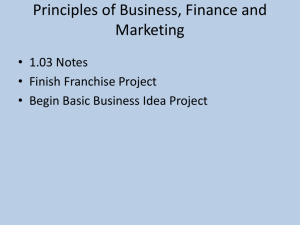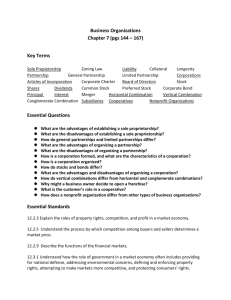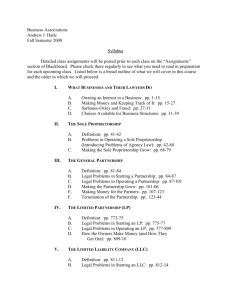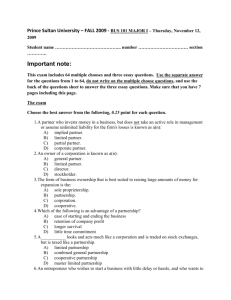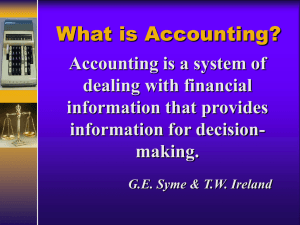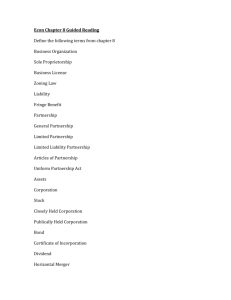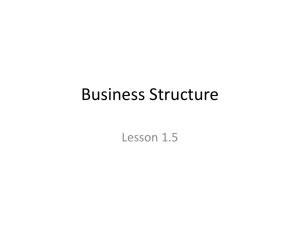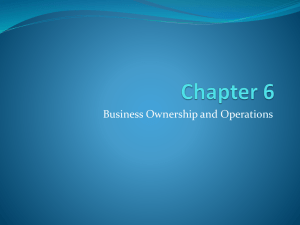Principles of Business, Finance and Marketing
advertisement
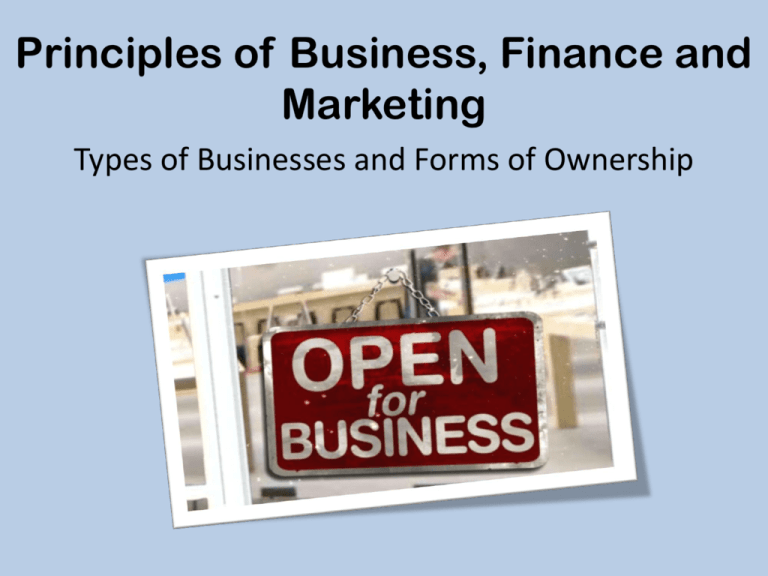
Principles of Business, Finance and Marketing Types of Businesses and Forms of Ownership Main Business Types • Sole Proprietor – McDonalds + Walmart started as one • Partnership – Google, Ben & Jerry’s, Apple, Microsoft, Warner Bros Started as partnerships. • Corporation Sole Proprietor • A business owned by only one person. Individuals who want to work and make decisions independently. Little government regulation. Great risk for the owner. • Most common legal form of ownership for new businesses • 15-20 Million sole proprietors in United States • Accounts for 75% of businesses in US • Examples: • • • • • Landscaping Computer Repair Photography Tutoring Maid Service Sole proprietor • Pros: – – – – – Control the entire business Keep all of the profits Make decisions quickly Easy to establish Pay fewer taxes • Cons – Unlimited liability (debts) Partnership • A business owned by two or more persons who share the risks and rewards. They share an idea for a business. They want to cooperate in managing and investing. • 3 Million business partnerships in United States • Partnership Agreement (not filed with the government) – Name of the new business – Amount each person is to invest in the business – Amount each partner is to draw in salary/profit – How profits/losses after salaries are paid will be shared in proportion to each partner’s investment – Responsibilities of the partners in the entity – What will happen in the event of death of a partner(s) Partnership • Pros: – Combine talents and financial resources – Share in responsibility of running the business and making decisions – Pays less taxes than a corporation • Cons: – Unlimited liability (debts) – Potential for disagreements – Loss of partner could mean end of business Corporation • A business treated by law as separate from its owners. It is a separate legal entity owned by one or more shareholders and managed by a board of directors. • Recognized as a person under the law • Require Articles of Incorporation • Sell Stock • Higher revenues Corporation • Key Terms – Stockholders/Shareholders: People who own stock in a corporation – Board of Directors: A group of people elected by shareholders to guide a corporation – Corporate Officers: are the directors and senior level management of a corporation – Charter: a license to operate from that state – Proxy: ability of a shareholder to vote on the affairs of a company • Pros: – – – – – Corporation Limited liability Share of the profits No management responsibility Can raise money by selling stock Easier to get credit • Cons: – Legal red tape – Lots of laws to follow! – Increased tax burden Business Ownership Distribution Factors for type of business ownership • the potential risks and liabilities of your business • capital resources needed • your income tax situation • your investment needs Franchise • A contractual agreement to sell a company’s products or services in a designated geographic area Franchise • Franchisee: the person or group of people who have received permission from a parent company to sell its products or services • Franchisor: the parent company that grants permission to a person or group to sell its products or services • McDonald’s – 75% of restaurants worldwide are owned by franchisees – Minimum $500,000 non-borrowed funds (25% cash) – Monthly Service Fee – 4% of sales Franchise • Pros: – – – – Name brand recognition Established method of doing business Access to centralized advertising Professional help in startup/training • Cons: – High startup costs in purchasing rights to use the business name – Must follow corporate standards Other types of businesses • Extractors: A business that grows products or takes raw materials from nature – Farming, mining • Producers: A business that gathers raw products in their natural state – Apiary • Processors: Businesses that change natural materials (raw goods) into a more finished form for manufacturers to process further – i.e. paper mills, oil refineries, steel mills, etc. Other types of businesses • Manufacturers: A business that takes an extractor’s products or raw materials and changes them into a form that consumers can use – Industrial production – i.e. General Motors, GE, Dell, Intel • Distribution: – Wholesale: A middle firm that assists with distribution activities between businesses • i.e. Sams, CostCo – Retail: A business firm that sells directly to the consumer • i.e. Gap, Target Other types of businesses • Service Firms: A business that does things for the consumer. – Intangible goods – Examples would be an airline, hair stylist and a doctor. Quick Quiz 1. A business owned by two or more persons who share the risks and rewards. They share an idea for a business. They want to cooperate in managing and investing. A) Sole Proprietorship C) Partnership B) Corporation 2. A business owned by only one person. Individuals who want to work and make decisions independently. Little government regulation. Great risk for the owner. A) Partnership B) Sole Proprietorship 3. Mary and John own a candy store together and each invested the same amount of money into the store. This is an example of a: A) Corporation C) Partnership B) Sole Proprietorship Quick Quiz 4. A business treated by law as separate from its owners. It is a separate legal entity owned by one or more shareholders and managed by a board of directors. A) Franchise C) Corporation B) Partnership 5. Apple Corporation sells shares of stock. This is an example of a: A) Sole Proprietorship C) Partnership B) Corporation 6. Jim is the only owner of Jim’s Hardware store. This is an example of a: A) Partnership C) Corporation B) Sole Proprietorship Quick Quiz 7. A contractual agreement to sell a company’s products or services in a designated geographic area A) Franchise C) Corporation B) Partnership 8. All of the following are examples of forms of business EXCEPT: A) Sole Proprietorship C) Partnership B) Corporation D) Board of Directors 9. Mr. Smith owns a McDonald’s in Galveston, Texas. His business is considered a: A) Partnership C) Corporation B) Franchise 10. A business that does things for the consumer. Examples would be an airline, hair stylist and a doctor. A) Private Enterprise C) Wholesaler B) Service Business Assignment • Create your own Business Intro for a PowerPoint • (Sole Proprietorship) • Slide 1 – Business Name and Logo with Slogan / Motto • Be Original and Creative! • Slide 2 – Location / Hours • Slide 3 – List some of the Goods and/or Services Offered • Save as yourlastname_logo and turn in to the class dropbox We’re #1 in the #2 Business!
